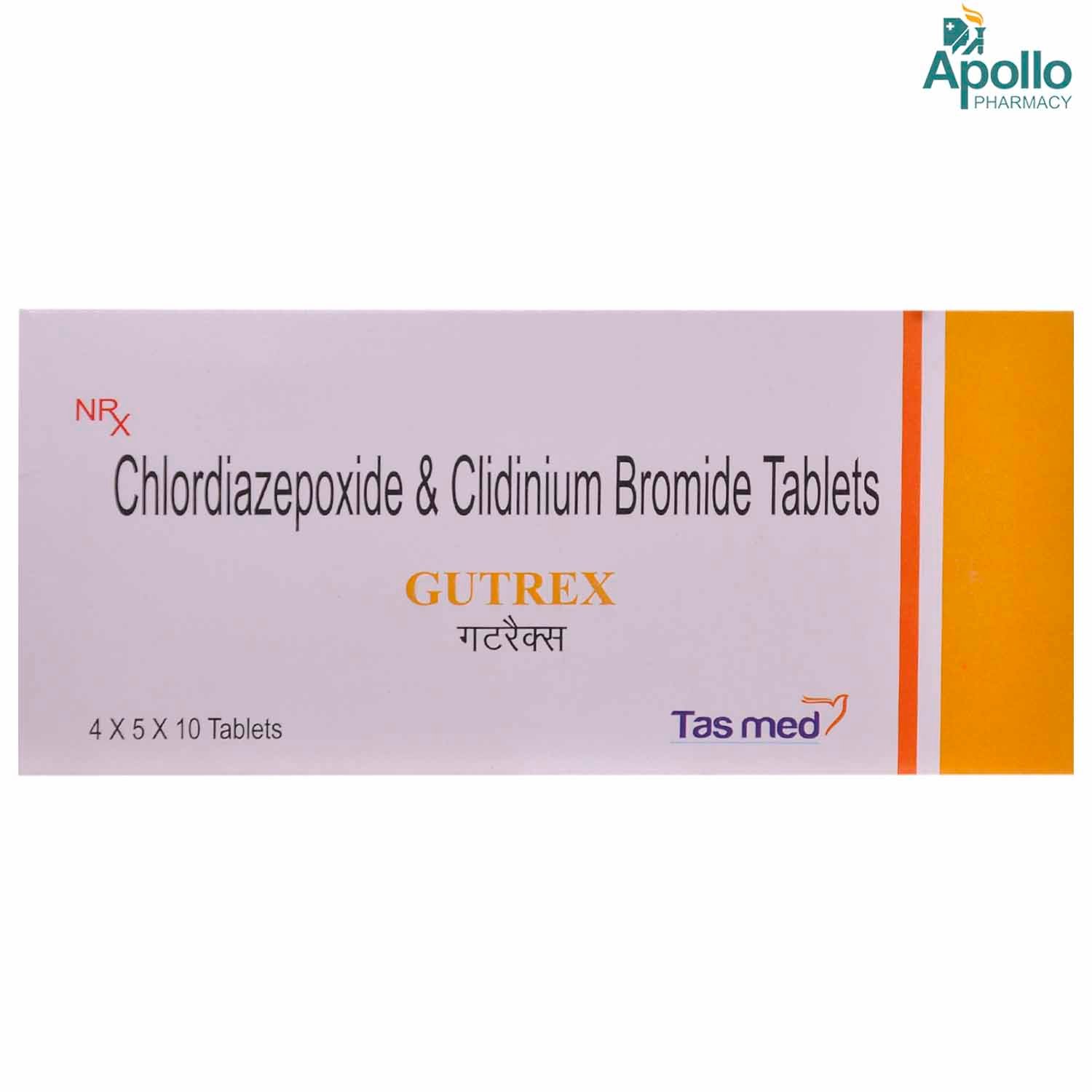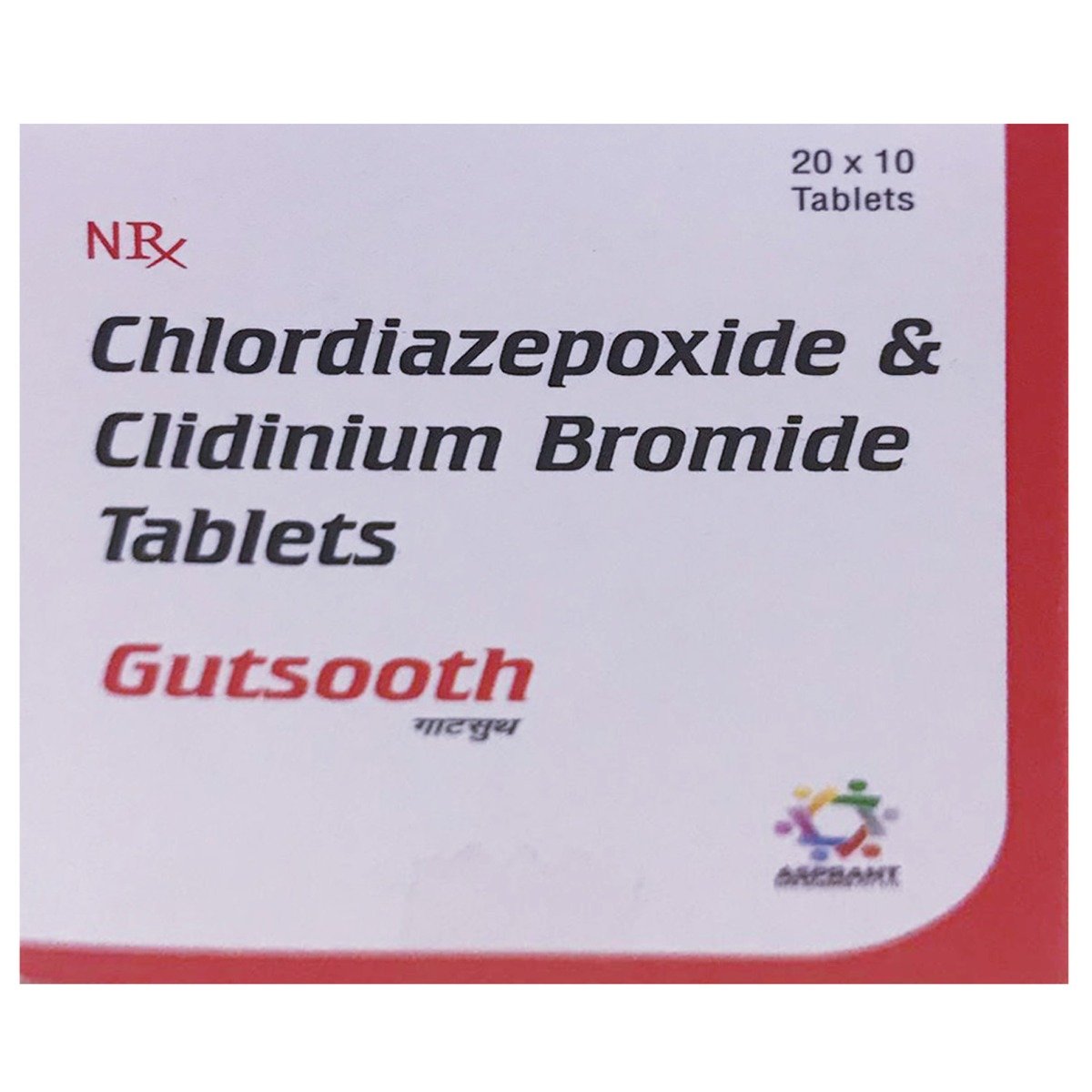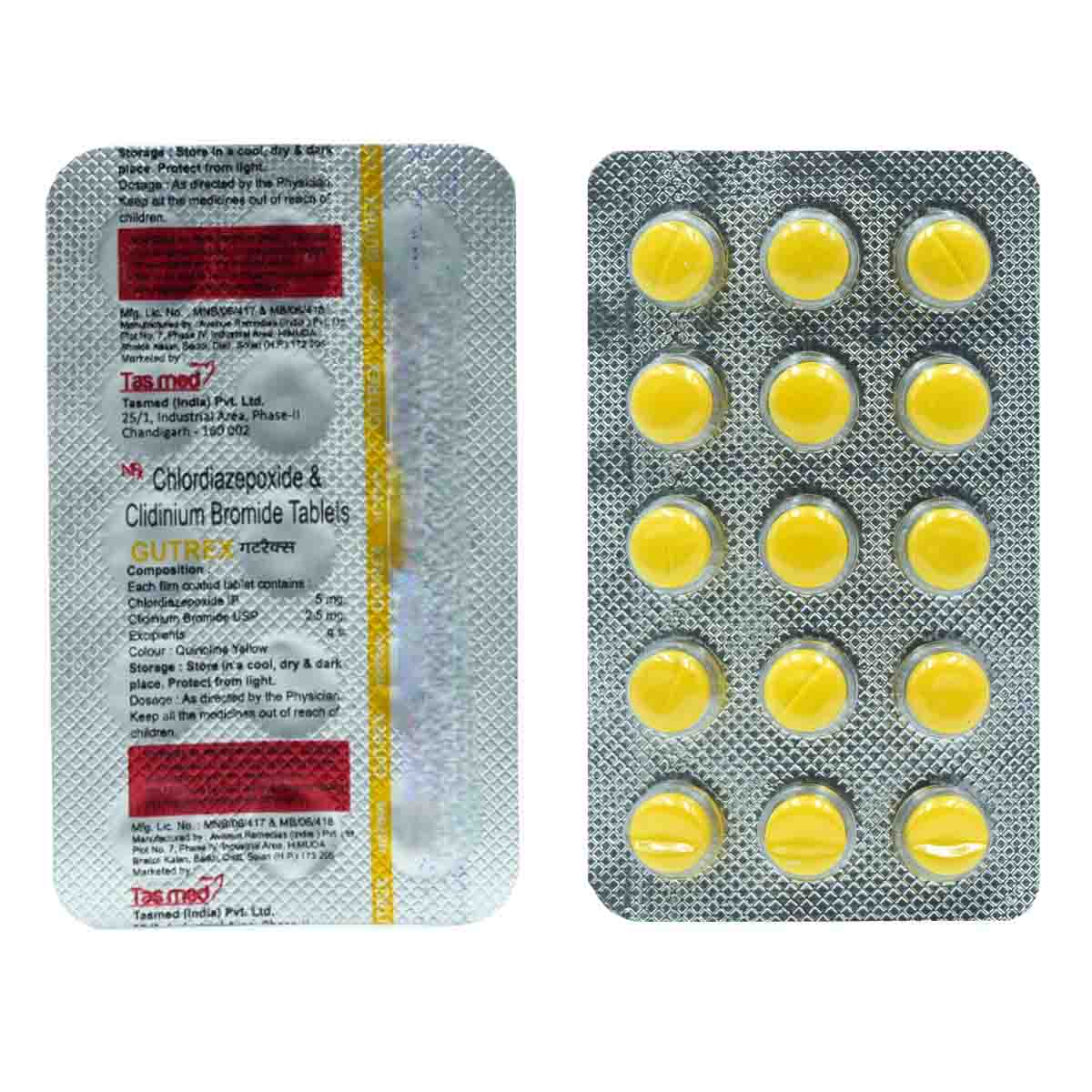Chlordiazepoxide+clidinium
About Chlordiazepoxide+clidinium
Chlordiazepoxide+clidinium belongs to a class of medications called ‘gastrointestinal agents’ used in the treatment of peptic ulcers, irritable bowel syndrome (IBS), and enterocolitis (swelling in the intestine). Peptic ulcers are sores that develop on the stomach and intestine lining due to erosion of the stomach's protective lining. An irritable bowel syndrome is a group of intestinal symptoms that occur together. Enterocolitis is an inflammation of the digestive tract caused by bacteria, viruses, parasites, fungus, or other causes.
Chlordiazepoxide+clidinium is a combination of two medicines: Chlordiazepoxide and Clidinium. Chlordiazepoxide is a benzodiazepine that decreases abnormal activity in the brain. It interferes with the chemical messenger's activity that passes messages to the brain cells, providing a calming effect and relaxing muscles. Clidinium is an anticholinergic that acts by decreasing stomach acid production. It helps to provide relief from stomach spasms and cramps.
Chlordiazepoxide+clidinium is available in the form of capsules. You should take this medicine as prescribed by your doctor. Chlordiazepoxide+clidinium may cause side-effects such as dry mouth, blurred vision, constipation, nausea, bloating, urination problems, drowsiness, dizziness, rash, swelling, irregular menstrual periods, and increased or decreased libido (sexual desire). Inform your doctor if any of these side-effects persist or get worsen.
Do not take Chlordiazepoxide+clidinium if you are allergic to Chlordiazepoxide, Clidinium, or any other ingredients present in it. Before taking Chlordiazepoxide+clidinium, inform your doctor if you have glaucoma (increased pressure inside the eye), enlarged prostate, difficulty urinating, heart problems, liver, or kidney diseases, depression, alcohol abuse, and high blood pressure. Chlordiazepoxide+clidinium is not recommended for use in children. Also, inform your doctor if you are pregnant, planning to become pregnant, or breastfeeding.
Uses of Chlordiazepoxide+clidinium
Medicinal Benefits
Chlordiazepoxide+clidinium is a combination of two medicines: Chlordiazepoxide and Clidinium. Chlordiazepoxide is a benzodiazepine that decreases abnormal activity in the brain. It interferes with the chemical messenger's activity that passes messages to the brain cells, providing a calming effect. It can also reduce anxiety related to gastrointestinal disorders. Clidinium is an anticholinergic that acts by decreasing stomach acid production. It helps to provide relief from stomach spasms and cramps. Together, Chlordiazepoxide+clidinium can be effectively used to treat gastrointestinal disorders such as peptic ulcers, irritable bowel syndrome (IBS), and enterocolitis (swelling in the intestine).
Directions for Use
Storage
Side Effects of Chlordiazepoxide+clidinium
- Dry mouth
- Blurred vision
- Constipation
- Nausea
- Bloating
- Urination problems
- Drowsiness
- Dizziness
- Rash
- Swelling
- Irregular menstrual periods
- Increased or decreased libido (sexual desire)
Drug Warnings
Chlordiazepoxide+clidinium should be used with caution in patients with drug abuse or addiction, vision problems, or urination problems. Do not take sedatives, pain killers, cough medicines, or other medicines that cause drowsiness along with Chlordiazepoxide+clidinium as it may cause fatal side-effects. Do not stop Chlordiazepoxide+clidinium abruptly as it may cause withdrawal symptoms such as fits, tremors, muscle cramps, stomach cramps, depression, vomiting, sleeping problems, and sweating.
Drug Interactions
Drug-drug interactions: Chlordiazepoxide+clidinium may interact with antacids, an anticoagulant (warfarin), antipsychotic medications (chlorpromazine, fluphenazine, and thioridazine), and antidepressants (isocarboxazid, linezolid, methylene blue, phenelzine, selegiline, and tranylcypromine).
Drug-food interactions: Avoid consumption of alcohol as it may increase drowsiness.
Drug-disease interactions: Chlordiazepoxide+clidinium should be used with caution in patients with glaucoma (increased pressure in the eye), prostatic hypertrophy (an enlarged prostate), bladder neck obstruction (a blockage of your bladder that causes problems with urination), liver and kidney problems.
Drug-Drug Interactions Checker List:
Safety Advice

Alcohol
unsafeAvoid alcohol intake as alcohol may increase drowsiness and also worsens the health condition.

Pregnancy
unsafeChlordiazepoxide+clidinium is a category D drug. It should not be used in pregnant women as it may cause birth defects to the unborn baby.

Breast Feeding
cautionChlordiazepoxide+clidinium may decrease the production of breast milk. So, it should be used with caution in breastfeeding mothers.

Driving
unsafeChlordiazepoxide+clidinium may cause drowsiness, so refrain from activities such as driving or operating heavy machinery.

Liver
cautionChlordiazepoxide+clidinium should be used with caution in patients with liver diseases. The dose may have to be adjusted by your doctor.

Kidney
cautionChlordiazepoxide+clidinium should be used with caution in patients with kidney diseases. The dose may have to be adjusted by your doctor.

Children
unsafeChlordiazepoxide+clidinium is not recommended for use in children under 12 years of age.
Habit Forming
Diet & Lifestyle Advise
- Eat smaller meals more often.
- Avoid smoking and alcohol consumption.
- Maintain a healthy weight by regular exercising.
- Avoid carbonated and caffeinated beverages.
- Practice relaxation techniques and avoid stress by doing yoga or meditation.
- Avoid foods such as high-fat food, spicy food, chocolates, citrus fruits, pineapple, tomato, onion, garlic, tea, and soda.
- Avoid deep-fried and spicy foods.
- Take foods containing probiotics as they may help in providing relief from gas and bloating.
Special Advise
- Do not stop taking Chlordiazepoxide+clidinium on your own, as it may cause withdrawal symptoms.
- Chlordiazepoxide+clidinium should be used with caution, and regular monitoring is advised in patients with glaucoma and benign prosthetic hyperplasia (BPH).
Patients Concern
Disease/Condition Glossary
Peptic ulcers: Peptic ulcers are sores that develop on the stomach and intestine lining due to erosion of the stomach protective lining. Symptoms include nausea, changes in appetite, bloody or dark stools, unexplained weight loss, vomiting, and indigestion.
Irritable bowel syndrome (IBS): It is a common disease that affects the large intestine. IBS is also known as irritable colon, spastic colon, spastic colitis, and mucous colitis. An irritable bowel syndrome is a group of intestinal symptoms that occur together. The exact cause is unknown, but common causes of IBS are acidity, stress, carbonated foods and beverages, irregular hormone levels, certain food, and medications. Symptoms include abdominal pain, cramps, bloating, gas, constipation, and diarrhea.
Enterocolitis: It is an inflammation of the digestive tract caused by bacteria, viruses, parasites, fungus, or other causes. Symptoms include loss of appetite, nausea, vomiting, abdominal pain, mucus-like discharge from the rectum, and diarrhea.
FAQs
Chlordiazepoxide+clidinium is a combination of two drugs: Chlordiazepoxide (benzodiazepine) and Clidinium (anti-cholinergic). Chlordiazepoxide decreases abnormal activity in the brain and relaxes gastrointestinal muscles. It also reduces anxiety associated with gastrointestinal disorders. Clidinium works by reducing stomach acid and decreases stomach spasms and cramps.
Chlordiazepoxide+clidinium should be used with caution in elderly patients as it may cause serious side-effects such as anxiety and confusion. So, it is recommended to consult a doctor before using Chlordiazepoxide+clidinium as the dose may have to be adjusted by your doctor.
Chlordiazepoxide+clidinium may be habit-forming, especially in people with a history of drug addiction or abuse, and in those who are alcoholics. So, before taking Chlordiazepoxide+clidinium discuss with your doctor the possible risks associated with this medicine.
Chlordiazepoxide+clidinium helps to treat stomach or peptic ulcers and prevent the recurrence of ulcers. It is advised to follow necessary dietary recommendations and precautions to prevent stomach ulcers.
Chlordiazepoxide+clidinium can reduce stomach pain associated with gastrointestinal disorders such as peptic ulcers, irritable bowel syndrome, and enterocolitis. It can reduce stomach spasms and cramps.
Chlordiazepoxide+clidinium may cause side-effects such as dry mouth, blurred vision, constipation, nausea, bloating, urination problems, drowsiness, dizziness, rash, swelling, irregular menstrual periods, and increased or decreased libido (sexual desire). Consult your doctor immediately if any of these side-effects persist or get worsen.






